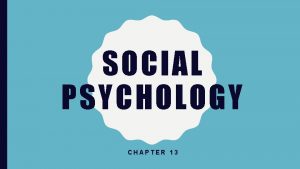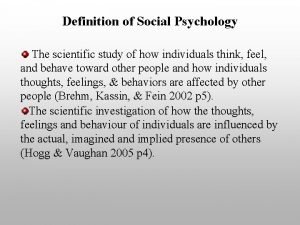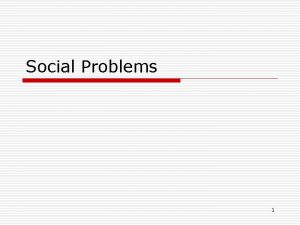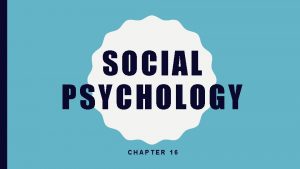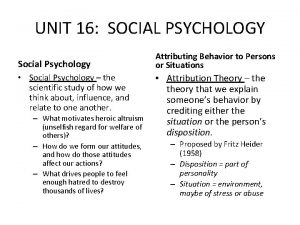Chapter 1 What is Social Psychology Defining Social


















- Slides: 18

Chapter 1 What is Social Psychology?

Defining Social Psychology • The scientific study of how individuals think, feel, and behave in social context. – Such as…? – We influence others and they influence us. – The Great Lesson (which often separates SP from the other disciplines).

Scientific Study • Social psychology relies on the scientific method. • Scientific method involves: – Systematic observation – Description – Measurement – It does not involve anecdotal experiences or case studies of individuals.

How Individuals Think, Feel, and Behave • Social psychology concerns a diverse set of topics. • Focus is on the psychology of the individual.

Social Context • Emphasis is on the social nature of individuals. – But, the “socialness” of social psychology varies. • “Other people” do not have to be real or present. – Even the implied or imagined presence of others can have important effects on individuals.

Social Psychological Questions

Social Psychological Questions

Social Psychology and Sociology • How are they different? – Sociology tends to focus on the group level. – Social psychology tends to focus on the individual level. • How do the fields intersect? – Often share the same training and publish in the same journals. – Both can help in understanding societal and immediate factors that influence behavior.

Social Psychology and Related Fields

Social Psychology and Common Sense • The “knew-it-all-along” phenomenon. • Common sense seems to explain many social psychological findings after the fact. – But how does one distinguish common sense facts from common sense myths? • Unlike common sense, social psychology uses the scientific method to put its theories to the test.

A Call to Action: 1930 s – 1950 s • Who had the most dramatic impact on social psychology? – Quite possibly Adolf Hitler! – Why?

A Call to Action: 1930 s – 1950 s (cont’d) • WWII prompted social psychologists to examine the nature of prejudice, aggression, and conformity • In 1953, Gordon Allport published The Nature of Prejudice • Solomon Asch’s research on conformity • Milgram’s famous obedience experiments

Social Psychology in a New Century • Integrating emotion, motivation, and cognition • Biological and evolutionary perspectives • Cultural perspectives • New technologies

Integration of emotion, motivation, and cognition • Integration of “hot” and “cold” variables concerning conflict of wanting to be right vs. wanting to feel good about oneself • Growing interest in distinguishing between automatic vs. controllable processes, and understanding dynamic between them

Biological and Evolutionary Perspectives • Social neuroscience • Behavioral genetics • Evolutionary psychology

Cultural Perspectives • Defining “culture” • Cross-cultural research • Multicultural research

Other Interdisciplinary Approaches • Behavioral economics

New Technologies • Brain imaging technology and procedures – positron emission tomography (PET) – event-related potential (ERP) – transcranial magnetic stimulation (TMS) – functional magnetic resonance imaging (f. MRI) • Internet
 Non defining relative clause examples
Non defining relative clause examples Relative clauses defining and non defining
Relative clauses defining and non defining Diferencia entre defining y non defining
Diferencia entre defining y non defining Defining relative clause meaning in telugu
Defining relative clause meaning in telugu Non-defining relative clauses cümleleri
Non-defining relative clauses cümleleri Defining and non-defining relative clauses
Defining and non-defining relative clauses Group polarization.
Group polarization. Social psychology ap psychology
Social psychology ap psychology Social psychology definition psychology
Social psychology definition psychology Definition of a social issue
Definition of a social issue Define policy practice
Define policy practice Social thinking and social influence
Social thinking and social influence Social thinking and social influence
Social thinking and social influence Chapter 12 social psychology
Chapter 12 social psychology Chapter 13 social psychology
Chapter 13 social psychology Chapter 16 social psychology
Chapter 16 social psychology Application of social psychology
Application of social psychology Positive psychology ap psychology definition
Positive psychology ap psychology definition Introspection method in psychology
Introspection method in psychology






